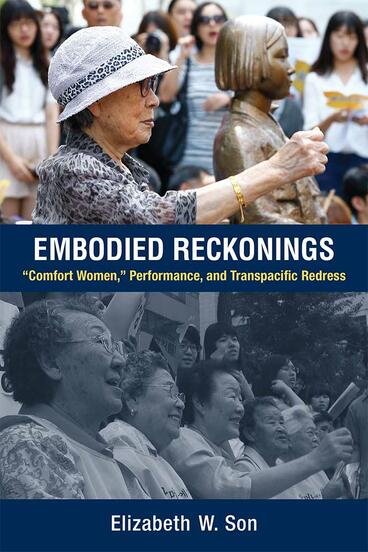Embodied Reckonings
“Comfort Women,” Performance, and Transpacific Redress
An illuminating study of how former Korean “comfort women” and their supporters have redressed history through protests, tribunals, theater, and memorial-building projects
Description
Embodied Reckonings examines the political and cultural aspects of contemporary performances that have grappled with the history of the “comfort women,” the Japanese military’s euphemism for the sexual enslavement of girls and young women—mostly Korean—in the years before and during World War II. Long silent, in the early 1990s these women and their supporters initiated varied performance practices—protests, tribunals, theater, and memorial-building projects—to demand justice for those affected by state-sponsored acts of violence. The book provides a critical framework for understanding how actions designed to bring about redress can move from the political and legal aspects of this concept to its cultural and social possibilities.
Based on extensive archival and ethnographic research, the study argues for the central role of performance in how Korean survivors, activists, and artists have redressed the histories—and erasures—of this sexual violence. Merging cultural studies and performance theory with a transnational, feminist analysis, the book illuminates the actions of ordinary people, thus offering ways of reconceptualizing legal and political understandings of redress that tend to concentrate on institutionalized forms of state-based remediation.
Elizabeth W. Son is Associate Professor of Theatre at Northwestern University.
Reviews
"The case studies are rich, provocative, and described with vivid detail. The book adds important geographical and cultural breadth to theater and performance studies, especially performance studies of law, violence, transitional justice, and human rights."
—Catherine Cole, Performing South Africa’s Truth Commission: Stages of Transition
“A deeply engaging and consistently insightful consideration of cultural practices that aim to bring justice to the survivors of wartime Japanese military sex slavery. The book makes multiple important interventions in the investigation of the relationships among activism, law, performance, theatricality and restorative justice.”
—Lisa Yoneyama, Cold War Ruins: Transpacific Critique of American Justice and Japanese War Crimes
“Elizabeth Son painstakingly follows the voices of survivors silenced by the violent forces of history, honoring their lived experiences and building connective tissues around them to illustrate the performative iterations of history and memory in the broad networks of dramatic texts, memorials, street demonstrations, stage work, and legal dramas. What emerges as a result is a powerful testimony, which has been often forced to silence and oblivion.”
—Suk-Young Kim, DMZ Crossing: Performing Emotional Citizenship Along the Korean Border
"Embodied Reckonings constitutes a new wave of scholarship that explores the cultural and aesthetic dimension of the 'comfort women' redress movement. It is also invaluable to scholars of performance studies, Asian American studies, and transpacific studies. Furthermore, it deserves the attention of those interested in the relationship between political activism and artistic expression more broadly."
- Lin Li, University of Wisconsin-Madison
—Journal of Asian Studies
"...Son’s Embodied Reckonings demonstrates how redress can extend beyond state or institutional acts. This book’s transpacific lens considers how activism and performance, education, memory and community-building can teach subsequent generations about sexual violence, restore survivors’ dignity, and reimagine reparations, more broadly."
- Journal of American Drama and Theatre
—Journal of American Drama and Theatre
Winner: Association for Asian American Studies (AAAS) 2020 Book Award in Humanities & Cultural Studies: Interdisciplinary/Media Studies
- AAAS Book Award in Humanities & Cultural Studies
Finalist: Theatre Library Association (TLA) 2019 George Freedley Memorial Award
- TLA George Freedley Memorial Award
Winner: National Communication Association (NCA) 2020 Bonnie Ritter Outstanding Feminist Book
- NCA Bonnie Ritter Outstanding Feminist Book Award
Winner: Organization for the Study of Communication, Language, and Gender (OSCLG) 2019 Outstanding Book Award
- OSCLG Outstanding Book Award

